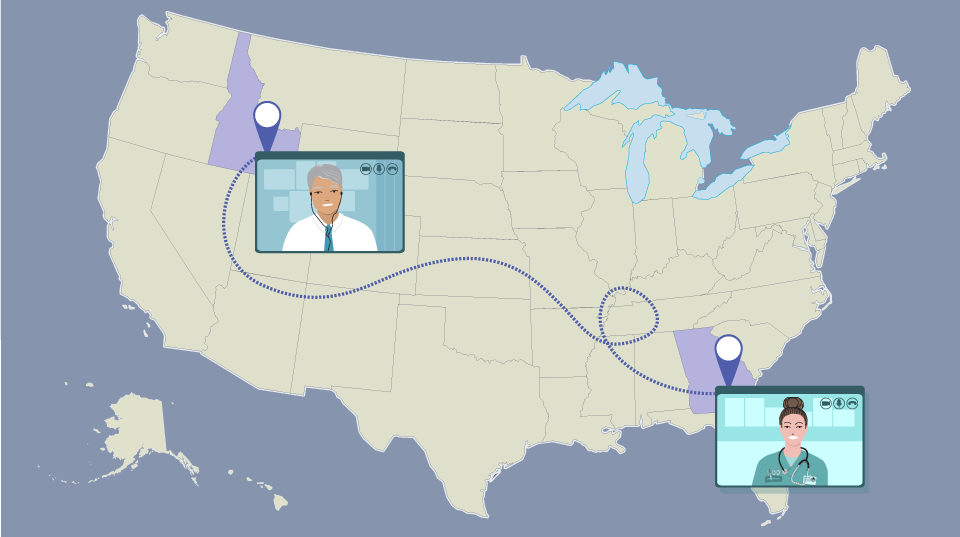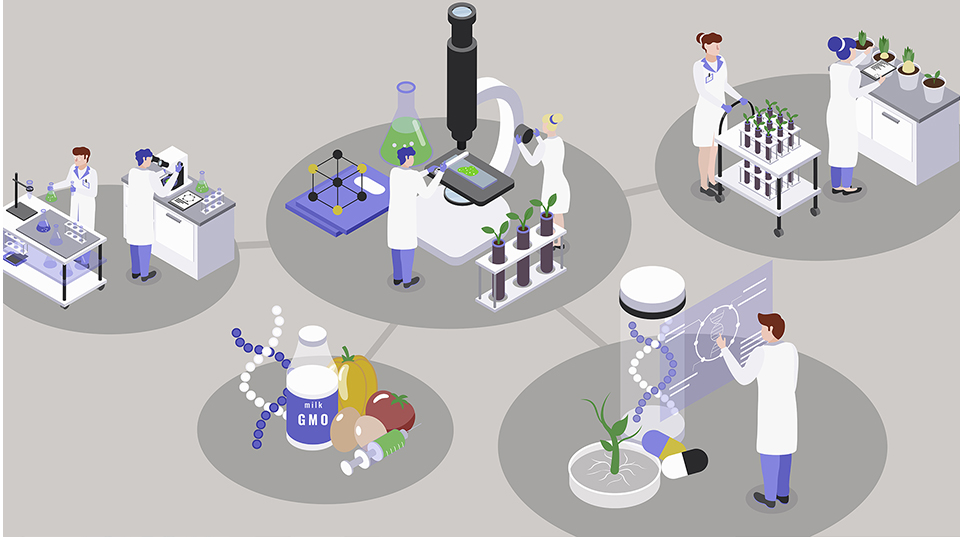Career resources content posted on NEJM CareerCenter is produced by freelance health care writers as an advertising service of NEJM Group, a division of the Massachusetts Medical Society and should not be construed as coming from, or representing the views of, the New England Journal of Medicine, NEJM Group, or the Massachusetts Medical Society
Professional organizations and technology resources make it easier for early-career physicians to connect with distant mentors
By Bonnie Darves, a freelance health care writer
Traditional one-on-one, in-person mentor-mentee arrangements are perhaps still the gold standard for young physicians seeking guidance from their older, more experienced colleagues, but physicians today often benefit from seeking a mentor, or an additional mentor, who is outside their training program or practice organization.
Such remote-mentoring arrangements can be especially valuable for young physicians who want to emulate the career trajectory of an esteemed physician who is across the country — or on the other side of the world — or who need help navigating a tricky professional or political environment in their city or region. And physician scientists working in a relatively small, niche research area may be compelled by geographical logistics to seek counsel from a colleague in a distant location. Further, many young physicians sometimes find themselves somewhat adrift in early career, when they’re no longer in proximity to the mentors from their training years.
The good news is that there are lots of ways to establish remote-mentoring relationships today for physicians who are prepared to do some research and some legwork. For starters, most physician professional organizations operate established regional and national programs connecting mentors with prospective mentees, and a simple email or phone call can get the process started. Another option is to identify national special-interest groups and participate in them with the intention of finding a future mentor. And increasingly, physicians are connecting remotely because the available technology makes that easy to accomplish.
“If there’s one thing COVID has taught us, among many other lessons, it’s that we can make satisfying virtual connections to broaden the possibilities if we’re looking for guidance,” said Anna Pereira, MD, MPH, a staff physician in palliative medicine and leadership development coach at Hennepin Healthcare and p of medicine at University of Minnesota Medical School. “A lot has changed in the past five years.”
Professional organizations provide starting point for mentor connections
It was actually during the early pandemic that the American Society of Regional Anesthesia and Pain Medicine (ASRA) launched its formal Physician Mentorship and Leadership Special Interest Group, when it recognized the growing need for early-career physicians to connect with their older counterparts, regardless of their location, said Brett J. Elmore, MD, who is vice chair of the group. “We wanted to create a space where ASRA members could easily connect for networking and mentoring, based on their needs or interests,” said Dr. Elmore, an associate professor of anesthesiology and orthopedic surgery who directs the regional anesthesia and acute pain medicine fellowship program at the University of Virginia.
ASRA’s mentor match pairing, which links early-career members with either mid- or late-career members in structured nine-month mentoring sessions, has proved immensely successful, Dr. Elmore reports, and to date has created more than 400 pairings. “It has really become entrenched in our society, and some of the pairs have continued their relationships,” he said. He added that video technology such as Zoom has been a boon to the program and that pairs are intentionally matched in advance of the society’s national meeting to give pairs an opportunity to meet face to face.
Jen Brull, MD, president-elect of the American Academy of Family Physicians, recommends that early-career physicians seeking mentors start with their professional organization and broaden their search from there, as needed or desired. “Many physicians are willing and available to mentor, and structured programs are a great way to start looking for one,” said Dr. Brull. She has mentored scores of medical students and trainees, including young physicians who eventually came to work in her former rural Kansas practice. “I have always enjoyed meeting the needs of physicians who need me,” said Dr. Brull, “and AAFP has lots of resources to help early-career physicians connect with senior colleagues willing to mentor them.”
One benefit of tapping into a professional organization’s resources as a starting point is that such mentoring programs serve as a platform for making remote connections, according to Jennifer E. Rosen, MD, regional chief of endocrine surgery at MedStar Washington Hospital Center and Georgetown University Medical Center.
“Remote mentoring requires having some way to introduce prospective mentors and mentees, and organizations’ programs also provide a way to break the ice”
—Jennifer E. Rosen, MD, MedStar Washington Hospital Center, and Georgetown University Medical Center
Dr. Rosen, who has been involved with several American College of Surgeons (ACS) programs that connect young surgeons with senior colleagues throughout the country. “Such programs also can help young physicians figure out what they’re seeking in a mentor,” Dr. Rosen said, thus avoiding an awkward introductory conversation.
The ACS’ Young Fellows Association (YFA), for example, operates two mentoring programs that provide career and skill-building opportunities as well as engagement experiences. Interestingly, YFA has offered successful mentor-mentee pairing programs that specifically and intentionally match mentees with mentors who aren’t in the same geographical location. “During the pandemic, we took full advantage of all that can be done with Zoom and other technology, and we found that it was very powerful for the pairs to see each other in person,” she said.
“One of the benefits of having mentors ‘from away’ is that it’s potentially a non-competitive [environment], and ‘remote’ exchanges can be less threatening,” said Dr. Pereira. “It’s sometimes easier to be open and honest about what you’re unsure about,” she said, if mentors and mentees aren’t in the same town.
Creating a mentor ‘ecosphere’ is essential
Young physicians, and even those entering their mid-career years who want to make new connections, might benefit from seeking out several types of mentors: clinical mentors, career mentors, life mentors, and, if applicable, research mentors. The mentor who can help you plan a future career move, cultivate a specialty niche, or obtain your next grant might not be the same person who can help you surmount organizational or political roadblocks. And the mentor who can help you navigate the perennial challenge of balancing your family life and your work life without compromising one or the other, by sharing wisdom and experience, might not even be in your field.
“The point is, we can’t all be everything for each other, and most of us need multiple mentors over the course of our careers”
—Ana Núñez, MD University of Minnesota
Ana Núñez, vice dean for diversity, equity, and inclusion and a professor of medicine at the University of Minnesota. And some of the best prospective mentors for young physicians, she said, might be colleagues they’ve never encountered.
Dr. Núñez added that it’s vital for underrepresented physicians to seek mentors to help them navigate environments and situations that may be unfamiliar to them. In such cases, she said, it can be helpful for physicians to seek out both senior colleagues and their peers. “There’s a real need for this kind of navigation mentoring. And don’t ignore peer mentors, former fellow medical students or residents who might be excellent mentors,” Dr. Núñez said, based on their professional experiences in the intervening years.
Dr. Pereira has long urged physicians to create a quilt of mentors to accommodate the various aspects of their professional and personal lives. She thinks it’s especially important for community practicing physicians to cultivate a range of mentors — both local individuals and some based elsewhere — and to ensure that the mix includes a life-planning mentor. “With the high rates of burnout and moral distress we’re seeing, it can be very helpful for young physicians to have a senior mentor,” she said, who has weathered such crises.
Dr. Rosen believes that mentoring relationships have become more important than ever for community practicing surgeons because of the increasingly complex compensation structures and time constraints surgeons face today. “There’s just less intellectual free time now,” she said, to discuss clinical and professional matters with colleagues, and having mentors, even remote ones, can help fill that gap. “People are stressed, and they’re looking for connections now — ways to get external input outside their institutions.”
For example, a surgeon working in a small hospital who wants to make the case to leadership for expanding procedure offerings over time will benefit from working with a distant mentor who has done that successfully, Dr. Rosen noted.
How to approach a prospective mentor
For physicians who want to explore remote mentoring possibilities and have a specific individual in mind, their chances of establishing a fruitful relationship increase substantially if they’re strategic, assertive, and thoughtful in their approach. The strategy part entails finding out as much as possible about the prospective mentor. In other words, read their work, review their presentations, and become generally knowledgeable about their career path to date. It’s also advisable to set down in writing precisely what the mentee is seeking initially and how that might connect to career goals over the longer term. In other words, be prepared to spend time and energy before approaching the individual via email.
Then craft the email. That missive should make it clear that the prospective mentee knows the possible mentor’s work. In Dr. Rosen’s view, an effective way to begin is to reference a recently published work or presentation. “You might start by saying that you saw the physician’s talk or read a recent article on a subject of mutual interest,” she said, “and that you’d like to connect with them.” The writer should also briefly describe who they are and why they want to make the connection. “Be very clear about exactly what you’re asking,” she said.
“It’s very important to personalize that initial communication by ensuring [the recipient] that you’ve read as much as possible about them and that you have a specific objective in reaching out,” Dr. Pereira said. For example, if the young physician wants to combine clinical practice and teaching and the prospective mentor is exemplary in that regard, state that.
“Good communication is key, and young physicians can expect that a personalized and well-written email will be well received by a prospective mentor,” Dr. Elmore said.
One of the huge benefits of the internet and this technology-aided world we live in is that it’s easy to find a prospective mentor’s contact information. But just because it’s easy to connect, that doesn’t mean that the starting missive should be informal. It shouldn’t. It should be crafted in a concise, professional, thoughtful, and ideally mildly persuasive tone that might interest the prospective mentor in making contact.
It’s also important to recognize that even the best-crafted request might not work out, said Dr. Brull, and to prepare for that possibility. “It’s easy to track down someone’s email. The trick is in crafting your ‘ask’ so that people [possible mentors] can respond graciously if their lives just won’t support establishing a new mentor relationship,” she said.
Several sources interviewed for this article acknowledged that it can be difficult to make that initial mentor connection. Physicians, especially those in leadership roles, are extremely busy, and email inboxes are quickly cluttered. Physicians who don’t receive a reasonably timely response (a few weeks) should reach out again, gently, to remind the prospective mentor of their interest. It can also be helpful to identify a potential conduit to the individual and reach out that way. “Email with no response usually just means that people are very busy. When you don’t hear back, consult the institution’s organization chart and try to find the physician’s administrative assistant, and ask for help,” said Dr. Núñez. “Sometimes, that works.”
What to expect in a successful mentor-mentee relationship
Young physicians seeking remote mentors will likely find them, provided they are strategic in their search and specific — and explicit — in making their request. Once they succeed in identifying a willing mentor, mentees should be ready and able to meet their responsibilities to ensure they hold up their side of the arrangement. Following are several key considerations for mentees as they proceed to establish and sustain mutually beneficial relationships with mentors.
When asking for a mentor’s time and assistance, be very specific in your request.
It’s best to state exactly what you’re seeking, whether that’s guidance on a particular project or counsel about making a career pivot, and to start with a small, time-limited email request. Rather than simply saying, “Will you be my mentor?” tell the prospective mentor specifically why you’ve reached out — as in, “I saw your talk on X, or I’ve been following your career/research.” Then ask if they’re amenable to a 20-minute phone or video conversation on a specific topic. “Keep it short and sweet,” Dr. Núñez advised, and make it clear and concise. “Don’t subject the person to a wall of words. Keep it to a half-screen on your computer.”
Be prepared to do the heavy lifting.
One mistake some mentees make, all sources agreed, is expecting that mentors will simply dole out advice while the mentee passively “receives” it. That’s not a relationship; it’s an information exchange, and one that’s not likely to be gratifying for the mentor. Instead, come to the mentoring session with specific questions (sent in advance) or an observation or reported clinical development, for example, that might interest the mentor or spark a discussion both will be interested in.
“When it’s a two-way street, it’s more rewarding for both the mentor and mentee. Mentees need to help with their side of the street.”
— Jen Brull, MD, AAFP President-elect
The heavy lifting also means completing any homework the mentor assigned or following up on the mentor’s recommendations. If the mentor suggests reading some studies, show up prepared to discuss them. If the mentor recommends taking a course, sign up and report that you’re on track to complete the course. And unless a clinical or personal emergency has occurred, mentees should always show up on time and ready to work, sources agreed.
Understand what a mentor relationship is — and isn’t — and establish a reasonable meeting cadence.
Mentor relationships are essentially business and professional relationships, at least initially, and should be treated as such. The meetings should be fairly formal, not just conversational, and should be structured to produce measurable or qualifiable results. That means mentees should respect the time that mentors have set aside for the engagement by contributing as actively as possible. “Mentees really have to prepare, and they must understand their responsibilities. One nice conversation does not a mentorship make. You must plan ahead to best honor the time together,” said Dr. Núñez.
Dr. Elmore urges young physicians to keep in mind that the relationship should be structured to “move” the mentee forward so that it produces measurable results. “It needs to have a prescription about what the relationship will do,” he said, even if the relationship also develops into a friendship over time. “If you’re too relaxed about it, the mentorship won’t be as fulfilling.”
Establishing an ideal cadence for the sessions in a remote-mentoring relationship can be difficult at first, especially if distant time zones are involved. Several sources recommended first asking what has worked in the past for the prospective mentor and proceeding from there. It’s unlikely, all agreed, that a mentor will have time to devote to weekly sessions, and even monthly ones might be too frequent for some busy mentors. Dr. Núñez recommended that mentees also avoid overloading themselves by committing to a too-frequent cadence. “You have to make sure that you can also commit to the schedule and your responsibilities for the sessions,” she said.







